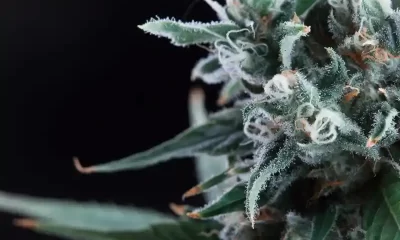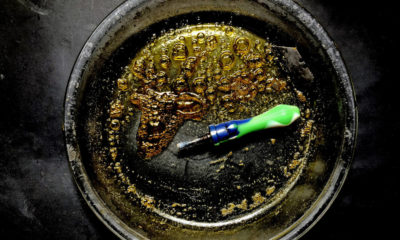Science
What Are CRC Extracts? Are They Safe For Consumption?
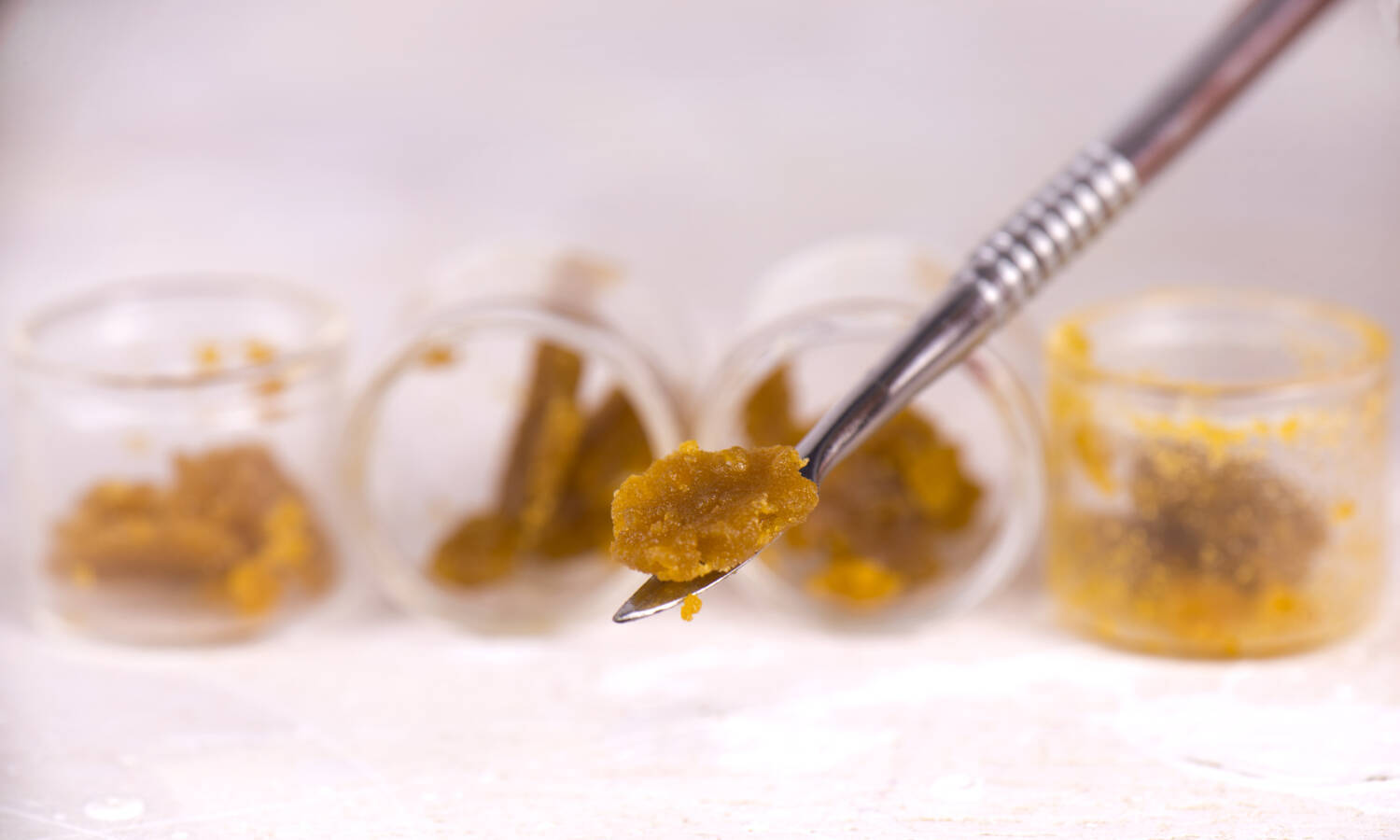
Currently, cannabis labs do not test for residual filtration mediums, so it’s hard to state definitively whether or not CRC-processed extracts are safe.
CRC (color remediation column) is a type of cannabis extract that is made using a process called “column chromatography.” It was initially started to remove dark colored substances left over from low-quality extraction, which signaled to the consumer its low grade.
The process makes the extract appear lighter, as lighter color extracts are associated with high quality. The idea was to enhance the visual aesthetic of a cannabis extract so it would sell better.
CRC has started to become a mainstream practice used by legal and illicit manufacturers to enhance the appearance of cannabis extracts. CRC has evolved and is now used to remove pesticides, unpleasant flavors, and other wanted byproducts.
CRC is most commonly used with butane hash oil. The color of low-grade hash oil changes from nearly “black, or dark brown, to light gold, or even white” when it undergoes CRC.
What is CRC extraction?
CRC extraction is a post-extraction process that uses technology to enhance the appearance of cannabis extracts and concentrates.
Column chromatography works by using a column (often a steel cylinder) and packing it with a filtration medium. Common filtration mediums include:
- Activated bleaching earth (used to remove colors)
- Activated carbon/charcoal (paired with activated silica gel to withdraw chlorophyll)
- Activated silica gel (used to remove very dark colors from an extract)
- Bentonite clay (used to remove colors and impurities)
- Diatomaceous earth (helps to create a fine filtration process)
- Magnesol (used to remove colors and impurities)
- Sand (used to remove impurities)
- T5 clay (remove colors and impurities)
The cannabis concentrate is then pushed through filtering mediums that result in the removal of color-impacting pollutants and other impurities. Pollutants and impurities that can be removed (depending on the filtration medium) include:
- Chlorophyll
- Carotene
- Lipids
- Lycopene
- Pheophytins
- Xanthophyll
One of the downsides of CRC is that it will also strip a concentrate of its terpene content. A way to tell if an extract or concentrate has undergone CRC is the smell. It may smell of chemicals, or may smell excessively fruity or earthy, indicating that it may have had terpene infused to attempt to restore the original flavor profile.
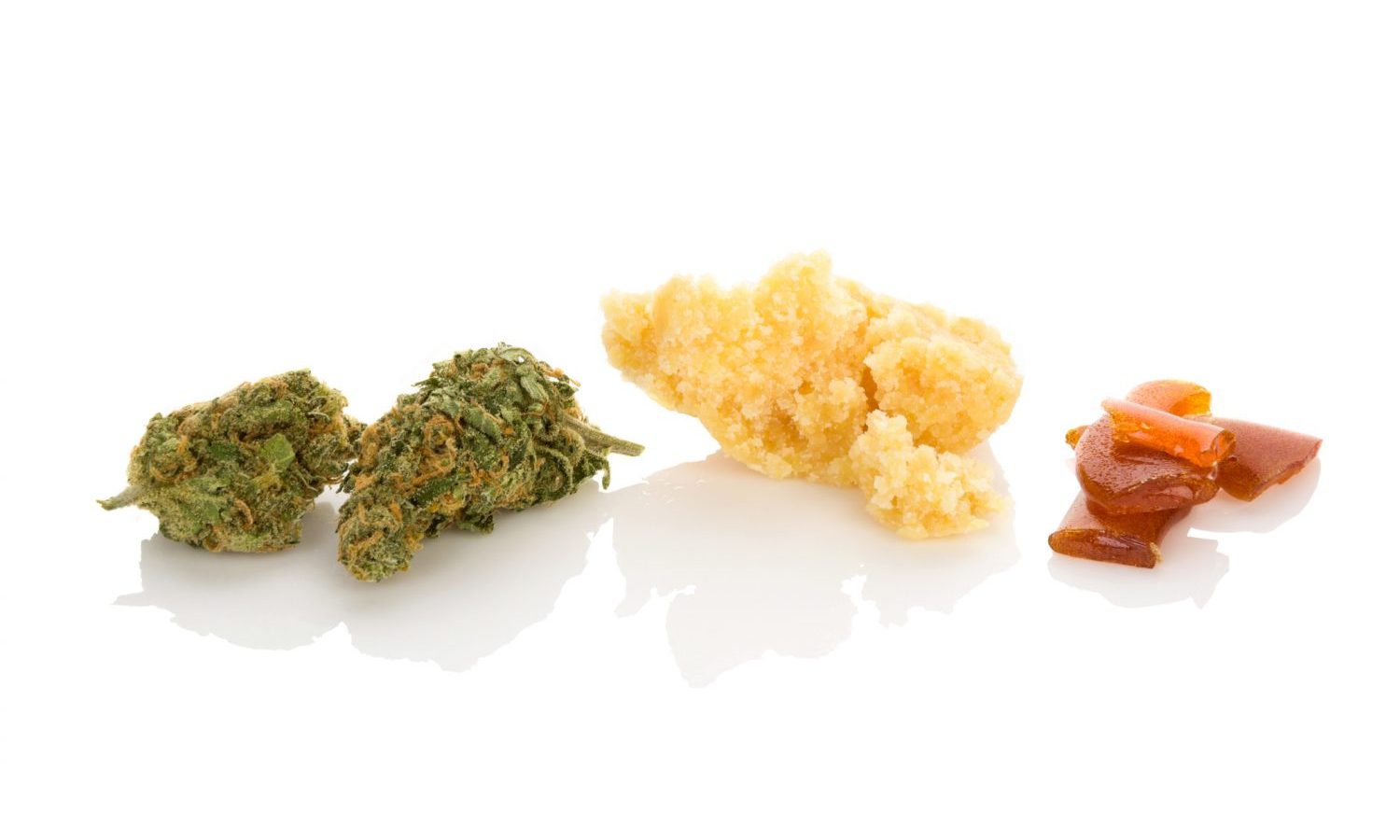
Is CRC wax bad for you?
This question is up for debate. A manufacturer who uses CRC will say CRC is safe, while a cannabis consumer advocate might not.
The debate is rooted in the fact that cannabis lab tests that deem if a product is safe for consumption do not currently test for CRC filtration mediums. As a result, a cannabis concentrate can be approved for sale despite containing contaminants from CRC filtration.
Some people believe CRC wax is not safe because:
- There is no regulation and testing for filtration mediums in the end product
- Long-term studies show that miners who inhaled bentonite clay and diatomaceous earth experienced respiratory damage, so vaping extracts that have trace amounts of bentonite clay and diatomaceous earth could lead to respiratory harm
- Bentonite clay can have elevated levels of lead
- The inhalation of silica gel can cause respiratory damage
- Manufacturers claim filtration materials are safe for use because the Food and Drug Administration (FDA) deemed them as “safe” but the safety approval only applies to ingested food products that could impact the stomach the approval does not apply to not inhaled products that impact lung tissue
- When CRC manufacturers push too much extract through a filtration medium at once, the filtration doesn’t work properly and results in contaminants in the final product
- Activated carbon from natural sources can release carcinogenic metabolites such as benzopyrenes
- Not switching out activated carbon mediums can result in the activated carbon breaking down and releasing heavy metals when overuse.
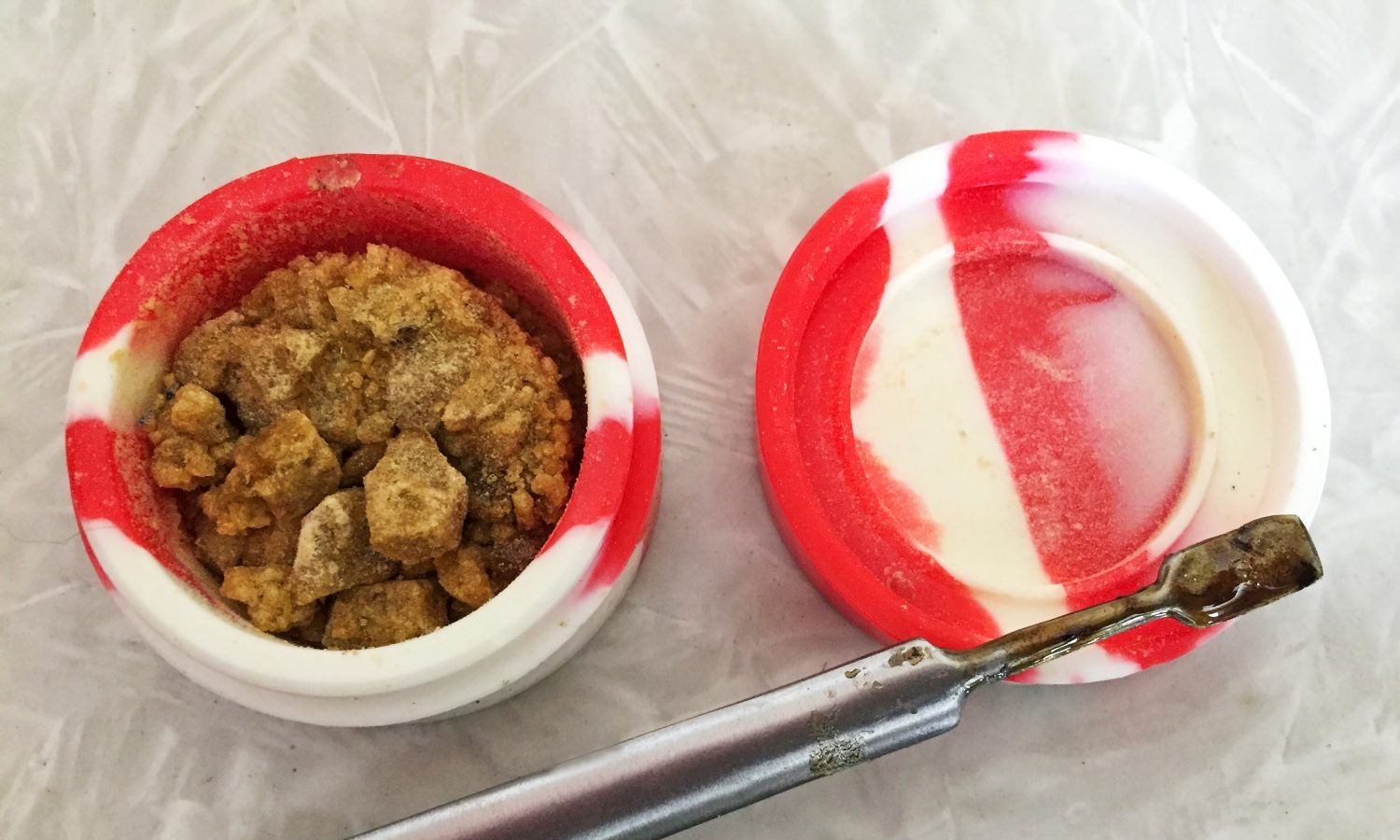
In theory, if a manufacturer properly does CRC extraction, the concentrate could come out with fewer contaminants.
If you are concerned about contaminants in your cannabis concentrates, ask your budtender if the product you’re interested in underwent CRC and what filtration mediums were used.
Key takeaways about CRC extracts
- CRC, or color remediation column, is a process used in the cannabis industry to remove impurities from extracts and enhance visual aesthetics.
- The debate surrounding CRC wax is whether or not it is safe for consumption. At the time of writing this, cannabis labs do not test for residual filtration mediums, so it’s hard to state definitively whether or not CRC-processed extracts are safe.
- Long-term exposure to some of the materials used in CRC processing (such as bentonite clay and diatomaceous earth) can be harmful to respiratory health.
- If you’re interested in purchasing a CRC extract, you can ask your budtender what filtration methods were used.
Get started on your cannabis wellness journey
Have you started your cannabis wellness journey? Jointly is a new cannabis wellness app that helps you discover purposeful cannabis consumption so you can achieve your wellness goals with cannabis and CBD. On the Jointly app, you can find new cannabis products, rate products based on how well they helped you achieve your goals, and track and optimize 15 factors that can impact your cannabis experience. These 15 factors include your dose, the environment in which you consume cannabis, who you are with when you ingest, how hydrated you are, the quality of your diet, how much sleep you got last night, and more. Download the Jointly app on the App Store or the Google Play Store to get started on your cannabis wellness journey.
Source: https://thefreshtoast.com/cannabis/what-are-crc-extracts-are-they-safe-for-consumption/
Business
New Mexico cannabis operator fined, loses license for alleged BioTrack fraud

New Mexico regulators fined a cannabis operator nearly $300,000 and revoked its license after the company allegedly created fake reports in the state’s traceability software.
The New Mexico Cannabis Control Division (CCD) accused marijuana manufacturer and retailer Golden Roots of 11 violations, according to Albuquerque Business First.
Golden Roots operates the The Cannabis Revolution Dispensary.
The majority of the violations are related to the Albuquerque company’s improper use of BioTrack, which has been New Mexico’s track-and-trace vendor since 2015.
The CCD alleges Golden Roots reported marijuana production only two months after it had received its vertically integrated license, according to Albuquerque Business First.
Because cannabis takes longer than two months to be cultivated, the CCD was suspicious of the report.
After inspecting the company’s premises, the CCD alleged Golden Roots reported cultivation, transportation and sales in BioTrack but wasn’t able to provide officers who inspected the site evidence that the operator was cultivating cannabis.
In April, the CCD revoked Golden Roots’ license and issued a $10,000 fine, according to the news outlet.
The company requested a hearing, which the regulator scheduled for Sept. 1.
At the hearing, the CCD testified that the company’s dried-cannabis weights in BioTrack were suspicious because they didn’t seem to accurately reflect how much weight marijuana loses as it dries.
Company employees also poorly accounted for why they were making adjustments in the system of up to 24 pounds of cannabis, making comments such as “bad” or “mistake” in the software, Albuquerque Business First reported.
Golden Roots was fined $298,972.05 – the amount regulators allege the company made selling products that weren’t properly accounted for in BioTrack.
The CCD has been cracking down on cannabis operators accused of selling products procured from out-of-state or not grown legally:
- Regulators alleged in August that Albuquerque dispensary Sawmill Sweet Leaf sold out-of-state products and didn’t have a license for extraction.
- Paradise Exotics Distro lost its license in July after regulators alleged the company sold products made in California.
Golden Roots was the first alleged rulebreaker in New Mexico to be asked to pay a large fine.
Source: https://mjbizdaily.com/new-mexico-cannabis-operator-fined-loses-license-for-alleged-biotrack-fraud/
Business
Marijuana companies suing US attorney general in federal prohibition challenge

Four marijuana companies, including a multistate operator, have filed a lawsuit against U.S. Attorney General Merrick Garland in which they allege the federal MJ prohibition under the Controlled Substances Act is no longer constitutional.
According to the complaint, filed Thursday in U.S. District Court in Massachusetts, retailer Canna Provisions, Treevit delivery service CEO Gyasi Sellers, cultivator Wiseacre Farm and MSO Verano Holdings Corp. are all harmed by “the federal government’s unconstitutional ban on cultivating, manufacturing, distributing, or possessing intrastate marijuana.”
Verano is headquartered in Chicago but has operations in Massachusetts; the other three operators are based in Massachusetts.
The lawsuit seeks a ruling that the “Controlled Substances Act is unconstitutional as applied to the intrastate cultivation, manufacture, possession, and distribution of marijuana pursuant to state law.”
The companies want the case to go before the U.S. Supreme Court.
They hired prominent law firm Boies Schiller Flexner to represent them.
The New York-based firm’s principal is David Boies, whose former clients include Microsoft, former presidential candidate Al Gore and Elizabeth Holmes’ disgraced startup Theranos.
Similar challenges to the federal Controlled Substances Act (CSA) have failed.
One such challenge led to a landmark Supreme Court decision in 2005.
In Gonzalez vs. Raich, the highest court in the United States ruled in a 6-3 decision that the commerce clause of the U.S. Constitution gave Congress the power to outlaw marijuana federally, even though state laws allow the cultivation and sale of cannabis.
In the 18 years since that ruling, 23 states and the District of Columbia have legalized adult-use marijuana and the federal government has allowed a multibillion-dollar cannabis industry to thrive.
Since both Congress and the U.S. Department of Justice, currently headed by Garland, have declined to intervene in state-licensed marijuana markets, the key facts that led to the Supreme Court’s 2005 ruling “no longer apply,” Boies said in a statement Thursday.
“The Supreme Court has since made clear that the federal government lacks the authority to regulate purely intrastate commerce,” Boies said.
“Moreover, the facts on which those precedents are based are no longer true.”
Verano President Darren Weiss said in a statement the company is “prepared to bring this case all the way to the Supreme Court in order to align federal law with how Congress has acted for years.”
While the Biden administration’s push to reschedule marijuana would help solve marijuana operators’ federal tax woes, neither rescheduling nor modest Congressional reforms such as the SAFER Banking Act “solve the fundamental issue,” Weiss added.
“The application of the CSA to lawful state-run cannabis business is an unconstitutional overreach on state sovereignty that has led to decades of harm, failed businesses, lost jobs, and unsafe working conditions.”
Business
Alabama to make another attempt Dec. 1 to award medical cannabis licenses

Alabama regulators are targeting Dec. 1 to award the first batch of medical cannabis business licenses after the agency’s first two attempts were scrapped because of scoring errors and litigation.
The first licenses will be awarded to individual cultivators, delivery providers, processors, dispensaries and state testing labs, according to the Alabama Medical Cannabis Commission (AMCC).
Then, on Dec. 12, the AMCC will award licenses for vertically integrated operations, a designation set primarily for multistate operators.
Licenses are expected to be handed out 28 days after they have been awarded, so MMJ production could begin in early January, according to the Alabama Daily News.
That means MMJ products could be available for patients around early March, an AMCC spokesperson told the media outlet.
Regulators initially awarded 21 business licenses in June, only to void them after applicants alleged inconsistencies with how the applications were scored.
Then, in August, the state awarded 24 different licenses – 19 went to June recipients – only to reverse themselves again and scratch those licenses after spurned applicants filed lawsuits.
A state judge dismissed a lawsuit filed by Chicago-based MSO Verano Holdings Corp., but another lawsuit is pending.
Source: https://mjbizdaily.com/alabama-plans-to-award-medical-cannabis-licenses-dec-1/
-

 Business2 years ago
Business2 years agoPot Odor Does Not Justify Probable Cause for Vehicle Searches, Minnesota Court Affirms
-

 Business2 years ago
Business2 years agoNew Mexico cannabis operator fined, loses license for alleged BioTrack fraud
-

 Business2 years ago
Business2 years agoAlabama to make another attempt Dec. 1 to award medical cannabis licenses
-

 Business2 years ago
Business2 years agoWashington State Pays Out $9.4 Million in Refunds Relating to Drug Convictions
-

 Business2 years ago
Business2 years agoMarijuana companies suing US attorney general in federal prohibition challenge
-

 Business2 years ago
Business2 years agoLegal Marijuana Handed A Nothing Burger From NY State
-

 Business2 years ago
Business2 years agoCan Cannabis Help Seasonal Depression
-

 Blogs2 years ago
Blogs2 years agoCannabis Art Is Flourishing On Etsy


